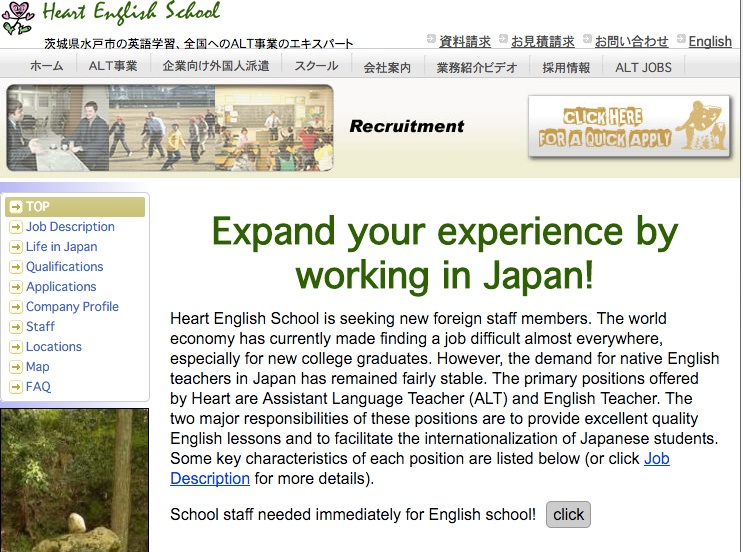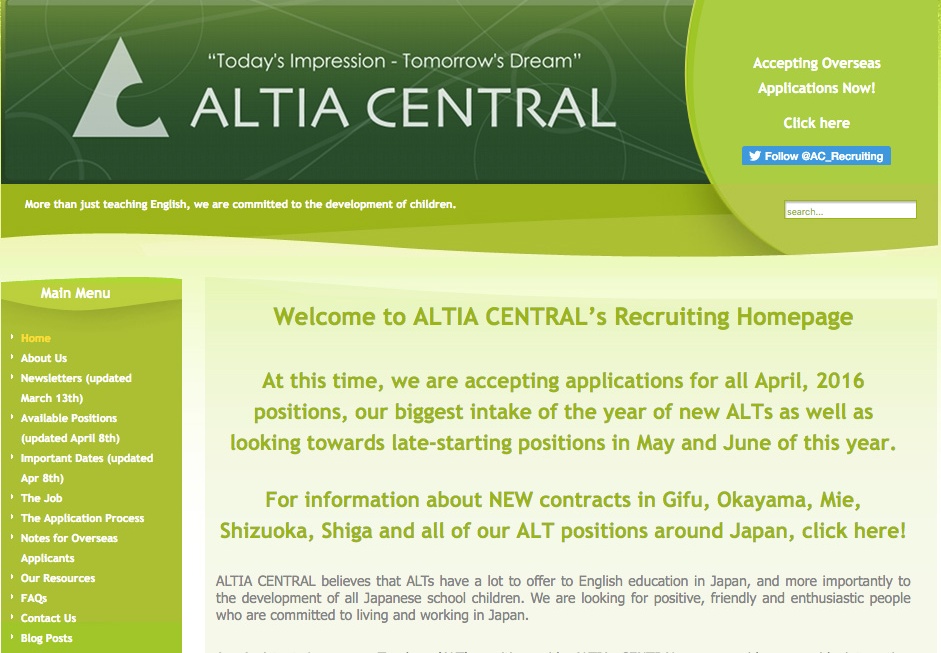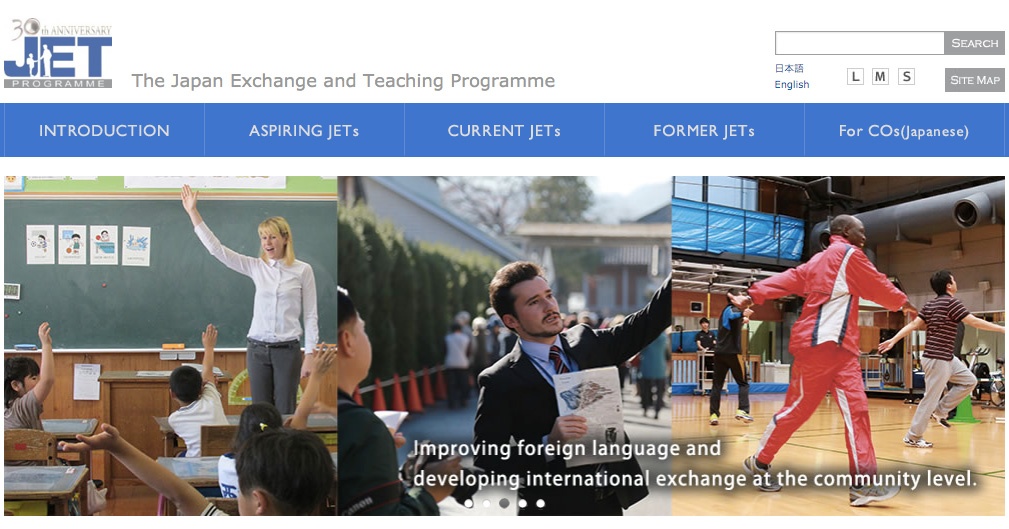6 Ways to Be an ALT
Let’s say you’ve decided you want to try living in Japan. While it’s a big decision, once you’ve decided, the easy part is over. It’s time to figure out the path that suits you best, and we’re here to help, with a brief overview of six ways to become an ALT, one of several ways you can come teach in Japan.
By Nicholas RichWhat is an ALT?

http://www.eventfinda.co.nz/2012/teach-english-in-japan-2013-jet-programme-info-session/palmerston-north
An ALT, or Assistant Language Teacher, is the industry term used to refer to a (usually) native English speaker who works in the public school system in Japan as an English teacher, with the only hard requirements being a college degree, as well as a formative education in an English environment (exactly what this means depends on the company you work for).
While the role the ALT plays at the school is determined by a lot of variables such as school level, location, etc., the job usually requires going to one or more schools a day to supplement students' English education by providing them with an opportunity to interact with a non-Japanese English speaker and gain some insight into foreign cultures. You’ll generally have between three and six classes a day, five days a week.
It’s great for anyone with an interest in working in education or working with children, and because you work in public schools, you reap the benefit of all national holidays, which affords you plenty of free time to explore the country, especially during summer vacation. As many sites will tell you, it’s a great way to get paid to experience life in Japan, whether it’s an urban environment, a rural village, or somewhere in between.
Now that we’ve established what an ALT is, let’s get into the nitty gritty of how to become one. We’ll take a look at six options, including a few private dispatch companies, the JET program, and direct-hire scenarios.
1. Interac
https://www.youtube.com/watch?v=j5exBsYdyFo
Interac was founded in 1972, and is the largest private provider of ALTs in the country. It operates nationally, with a network of 13 offices throughout Japan, and provides ALTs for all levels of public education. The corporate philosophy is to “promote a deeper understanding of languages, cultures, and education throughout the world.”
Like most private ALT providers, Interac is considered a "dispatch" company, meaning its teachers are Interac employees dispatched to various public schools, and not employees of the schools themselves. This means that while you work in schools, you have to contact Interac about things like contracting, holidays, sick leave, etc.
Interac has recruitment for two main contract periods: one for late March/early April, to coincide with the beginning of a new school year, and one for late August, which is usually when schools come back from summer vacation. The typical starting salary is between ¥230,000 to ¥250,000 per month, although it is pro-rated in the vacation-heavy months of March, April, August and December.
Interac’s training usually includes a rigorous multi-day orientation to help equip you with the skills necessary for the job, and the branches have meetings for ALTs as part of their ongoing training program, though the frequency tends to vary depending on where you work. Like most private companies, Interac provides support for getting you set up with housing, opening a bank account, and other essentials for life in Japan. For more information, including how to apply, visit the link below.
2. Heart English School
Heart English School is another private provider of ALTs that works primarily in the Kanto region, which includes Ibaraki, Chiba, Tokyo, Saitama, Gunma and Tochigi Prefectures. Salaries for teachers tend to be lower than other dispatch companies, but the specifics depend on the number of days you're working and whether you're full- or part-time (for example, ¥160,000 for a four-day-a-week position).
While the job description is fairly similar to other ALT companies, there are a few differences worth noting. First, Heart requests potential applicants to have a basic understanding of Japanese, or at least a strong desire to learn. While your job is teaching English, the company appreciates the bumps that can be smoothed out by communicating with Japanese school teachers in their native language.
While Heart works primarily in public schools, it also provides conversation classes at its own private schools, as well as corporate English lessons. Heart also provides job placement assistance for employees with N2 level Japanese or better, in the event that you decide to pursue a career in a different field. Although the website looks a bit dated, it’s frankly written and includes loads of useful information.
3. Borderlink
Borderlink came onto the scene in the year 2000 with an interest in helping students in Japan understand the world outside their country’s borders. It operates in the Kanto region, the Koshinetsu region (specifically, Niigata Prefecture), the Kansai region (Osaka, Shiga and Hyogo Prefectures), as well as the Chubu region (Aichi and Gifu Prefectures). The company provides ALTs for public schools, and the salary starts at about ¥200,000 per month, but depends on your experience and credentials. It also offers part-time work for staff during the month of August, including tutoring for speech contests or working for summer programs.
Borderlink provides its ALTs with about a week of initial training about life in Japan, working in Japanese schools and lesson planning, as well as further training periodically throughout the year. Like other companies, Borderlink will sponsor visas, assist with finding housing, and even promises to have staff available 24 hours to help in the event of a medical emergency.
For more information about the positions on offer, as well as the corporate philosophy, take a look at the website below.
4. Altia Central
Altia Central was founded in 2001, and operates under a simple slogan: “Today’s Impression – Tomorrow’s Dream.” The company offers positions in 10 prefectures in central and southern Japan, including Aichi, Shizuoka, Gifu, Hiroshima, Osaka, Mie, Nagano, Okayama, Shiga and Fukui Prefectures, with the head office located in Nagoya.
Salary at Altia Central is competitive, running between ¥240,000 and ¥255,000 per month, with the extremely rare benefit (when it comes to private companies) of having fully paid summer and winter breaks. Altia also offers incentives like bonuses for renewing your contract for another year, and award money for passing certain levels of the Japanese Language Proficiency Test (JLPT). Like other companies, it offers about a week of initial training during orientation, and follow-up training throughout the school year.
For further information, as well as current openings, visit the link below.
5. JET Programme
The JET Programme, or Japan Exchange and Teaching Programme, is a globally known, government-sponsored program that receives support from many different governmental agencies. It was created in 1987 with the goal of “increasing mutual understanding between the people of Japan and the people of other nations,” and has gone from having only four participating countries at its genesis to over 40 countries from all around the world today.
When compared to private companies, the JET Programme is unique for several reasons. First, the application process is quite rigorous, and if you don’t follow the programme guidelines to the T, your application won’t be considered. Another distinction worth noting is that while you’ll generally have some influence on what area of Japan you’re placed in with private companies, with JET, you are assigned a placement location, and that’s that. If you refuse that placement, you aren’t offered another, and you will no longer be considered eligible for the program in subsequent years.
Another significant difference is the types of positions available. As well as ALTs positions, JET also offers CIR (Coordinator for International Relations) positions that involve working with governmental offices, and demand a high level of Japanese language ability, as well as the limited, recently-added SEA (Sports Exchange Advisor) position, which involves professional coaching of sports teams.
Then there are the perks, of which the JET Programme has plenty. Because of the ironclad nature of the contract, JET provides fully paid flights to and from Japan when your contract begins and ends. Depending on the location of your placement, the programme offers spacious subsidized housing, as well as a vehicle for transportation. Salary is structured so that the longer you stay on contract, the higher you’re paid, and it starts at ¥3,360,000 for the first contract year, up to ¥3,960,000 for the fifth (and final) contract year. While you technically have to work during holidays, you’ll have over 20 vacation days to use at your discretion, as well as a separate pool of sick days.
Another benefit is the sense of community fostered in the JET community. Beyond the initial training and support, the JET Programme has mandatory seminars as well as social organizations such as AJET to help people find their feet and feel connected when they arrive.
For more information (so much information!) on the JET Programme, check out the link below.
6. Direct Hire
The final method we’ll discuss for becoming an ALT is somewhat of a holy grail: the direct hire. Essentially, what it means is that instead of working for a dispatch company or for the JET Programme and its various administrations, you work with a school directly, and have a contract with the local board of education (BOE). Benefits include a salary usually (but not always!) in line with the JET Programme, and positions tend to come with the flexible work time of dispatch companies, without office bigwigs breathing down your neck. Of course, as with other options, the specifics will depend on the school and board of education.
Direct hire positions are elusive, however, and there are almost no general rules regarding how to obtain a position as a direct hire. It’s usually not something that you can just apply for from overseas, and more often than not it's a matter of being in the right place at the right time. But there are a few ways to give yourself a realistic chance of making it happen.
First, it's always a good idea to obtain prior experience as an ALT. Whether it’s through a dispatch company or as a JET, working as an ALT will give you valuable work experience that will help reassure potential BOEs that you’ve got a good head on your shoulders when it comes to getting the job done. This period also gives you a chance to make an impression on your present colleagues and administration officials, who might know about upcoming openings. Like any other job, networking is an important part of achieving your career goals.
It also helps if you know Japanese. Direct hires don’t receive the same type of hand-holding provided by JET and most dispatch companies, so knowing Japanese is essential for interacting with your co-workers and handling anything that might come up in your day-to-day.
It’s also an added benefit if you’ve put down some roots and started a family, especially for visa reasons, although of course not a prerequisite. On top of being reliable and low maintenance, BOEs like to know that you’re potentially in it for the long haul. That said, there are some direct hire positions that last a maximum of three years, so be sure to check if this applies to you before you start buying property!
For a more in-depth, tongue-in-cheek look at what it takes to lock down a direct hire position, click on the link below.









